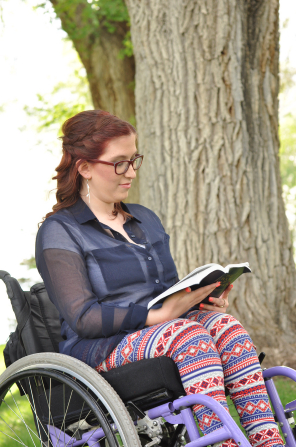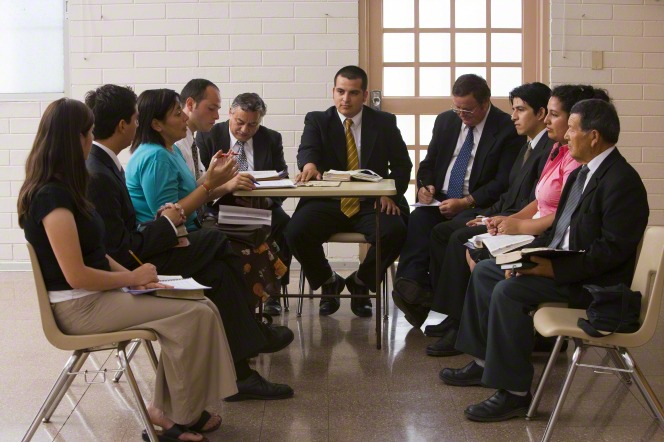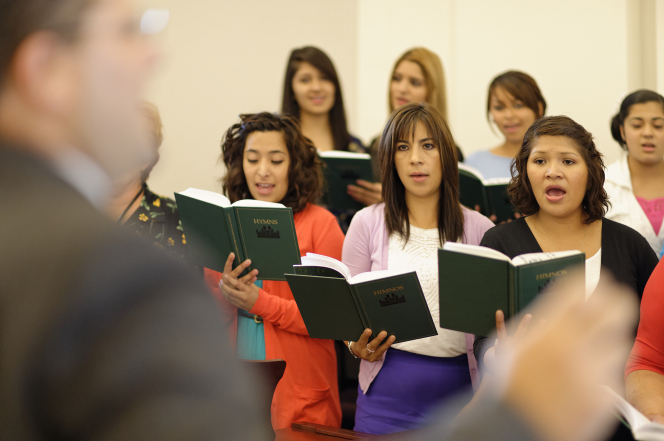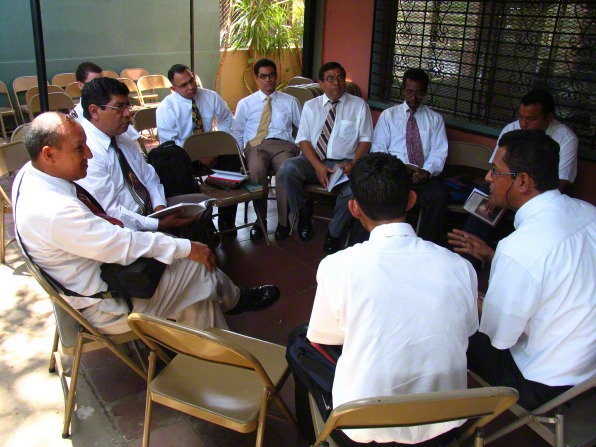With all the changes the Church of Jesus Christ of Latter-day Saints has been experiencing lately, I wonder if the next one might be the 9th Article of Faith. I keep waiting for President Russell M. Nelson to announce it's been changed to...
One of the great and important things pertaining to the kingdom of God that has been revealed is what the Church calls home-centered church-supported gospel learning.
We still are having 3-hour church,
it's just that now one of those hours is at home.
My friend has said that church used to be like going to a movie theater. We would listen, hope it would be interesting, but not much was needed on our end. Now we are coming to a gym, where we are all expected to work out and use our muscles. Elder Neil L. Andersen also compared gospel learning to a trip to the fitness center. He said, "[Learners] do not get stronger by watching someone else do the exercises. They learn and then participate. As their spiritual strength increases, they gain confidence and apply themselves all the more."1
When I taught at BYU, I gave all my students a super easy assignment. All they had to do was meet with me for about 10 minutes during my office hours sometime within the first two weeks of the semester.
Why would I give such an easy assignment? Here are some goals that I had for this assignment:
1. That they would know where my office is and when my office hours are.
2. That I could get to know them personally and they could get to know me.
3. That they would know I'm interested in them as an individual and want to support them in their educational goals.
4. That they would know I care.
5. That they would know I expect class participation.
6. To find out how they felt about participating in class.
7. Help them set goals to improve their class participation. Whether it was to speak up more, speak up less, or change the content of their comments.
8. That they could start the semester off with an A because they were about to take a brutal grammar test.
The reason for #7 is because I learned that when I asked a question in class, I typically had one of two reactions from the students. The student either quickly raised his or her hand eager to share their thoughts, or the student mulled it over and then on very rare occasions raised their hand.
When I could see that I had students who wanted to say something but weren't raising their hands, I would meet with them privately to find out why. Almost always the answers were one of these two.
1. By the time I had formulated my thoughts, you had moved on to something else or it had already been said.
or
2. My comments aren't as good as everyone else's. I'm happy to just listen to what they have to say.
I made it my mission to figure out ways to encourage class participation, and not just any kind, but the kind that actually enhances everyone's educational experience. To do this, I realized that I need to encourage both the thinkers (the ones who took the time to think before they spoke) and the speakers (the ones who quickly raised their hands).
Before I go too much further, I just want to give a couple caveats.
1. We are all unique. I don't see people as either a speaker or a thinker. We can be both in different situations. I'm just dividing us out based on how we are behaving with a particular question. It's quite possible to know exactly what we want to say in one moment, and then to take the time to ponder the question the next.
2. There are lots of ways to participate in class, not just by commenting. I'll be sharing some of those later. If you aren't someone who even thinks to comment, that's okay. There are lots of other stuff for you to do too.
TIP #1 - REMEMBER YOUR WORTH
When my students told me they didn't feel like their comments were as good as others, I totally understood. They were attending a very competitive business program and most were getting ready to enter into the "real" corporate world where it was ruthless. It was easy for someone who had been top of their class in a small high school back in Idaho to come to Brigham Young University's Marriott School of Management and think, "I don't belong here." I felt like one of my roles was to tell them, "Yes you do."
It's so easy to fall into the trap of believing Satan's lies that you aren't smart enough or spiritual enough to make a comment in a class on Sunday.2 If you have ever fallen for this lie, know that you are not alone. In the early days of the Church, a sister told Eliza R. Snow that she would be willing to speak in church if the topic was housekeeping.3
Eliza responded with this:
If you are being prompted by the Spirit to say something, it just might be because someone else in the room needs to hear what you have to say and in the way that you are going to say it. It might be scary at first, but the more you try, the easier it will become.
Katherine Nelson was a young newlywed when she moved into a ward with other women who were grandmas and mothers. She was intimidated and shy. Inspired by Eliza R. Snow's comment, she decided to set small goals each Sunday. Eventually she learned that she too had something to contribute.5
TIP #2 - REMEMBER THE LAW OF THE WITNESSES
Or maybe you are like my BYU students and have something to say, but someone else beat you to it and made the same comment. If the Spirit is still prodding you to raise your hand, it might be because you are needed as a second witness.
If you feel like you don't have anything to say, because well, you just don't have anything to say. Remember, church is now like a gym. You aren't going to get stronger watching other people exercise. Tad Callister, the General Sunday School President, says that studies show very few members of the Church read the material in advance. Hopefully that number has increased since he said that in 2016. To avoid watching others doing their exercises, study the scriptures at home.6
When we take the time to study the scriptures, or as Tad Callister puts it, "sharpen the saw," we will gain in confidence and feel like we can contribute in the classroom.
CHALLENGE:
If you rarely or never make comments in class, set a goal to read the material in advance and come ready with something to say. You don't necessarily have to say anything, but just making the effort to can get you closer to eventually making a comment.
TIP #4 - WRITE DOWN YOUR THOUGHTS FIRST
Tad Callister gives a great tip that I think would help those who like to make comments in order to process their thoughts. He brings blank note cards with him to church. When an impression or doctrinal insight comes to his mind, he writes it down. He explains it this way:
TIP #5 - LOOK FOR OTHER WAYS TO PARTICIPATE
I promised I would talk about ways that we can contribute in class without making a comment at all. Here is a short list that I have come up with, hopefully you can think of more and add to it.
A word of caution. Do not get overenthusiastic in your encouragement of others. We don't want to make anyone feel uncomfortable or guilty for not saying something. Don't be sarcastic like saying, "You sure do talk too much, give others a chance." Or point out their shyness. Everyone should feel safe coming to church.7
CHALLENGE:
If you frequently comment in class, set a goal to find someone whom you could encourage. Think of a simple way you could express gratitude for what they said.
First of all. Thank you. You've been asked to teach while the Church is changing (or should I say overhauling) the curriculum. No longer are you expected to stand at the front of the class with lots of stories, quotes, and scriptures to recite, but are to somehow inspire all of us to bring those things with us to share. Some days you probably feel like tapping the mic and saying, "Is this thing on?" and other days you probably are wondering how you can get a word in edgewise. Thank you for your efforts to follow the Spirit and inspiring us to come to Christ.
TIP #7 - REMEMBER YOU TEACH PEOPLE NOT LESSONS
Fortunately there are lots of resources and guidance provided by the Church to help you. But before I share some of those, I want to share something that Jeffrey R. Holland said in his article in the December 2018 Ensign. You are teaching people not lessons. You know these people better than any manual possibly can. Your efforts to live the principles you are trying to teach will do more to reach the class than any suggestion in a lesson manual.1
Holland points out that worrying about the chalkboard, the manual, the arrangement of the chairs, or even excellent discussion questions might not be the right focus. The object of our effort should each individual child of God and his or her eternal progression. We are trying to touch lives and we only touch chalk or audiovisual equipment if it will help us touch a life.1
TIP #8 - TRY DIFFERENT TEACHING METHODS
Brian K. Ashton from the General Sunday School Presidency said in August 2018 that lecturing has been replaced almost exclusively with discussion. He says that even the term "teacher" has been replaced with the words "facilitator," "moderator," or "discussion leader." He points out that while discussion is an effective method, Christlike teachers are so much more than a discussion leader. We should be striving to teach as the Savior did.8
I'd like to use the story of when Christ and Nicodemus visited at night as an example. When Nicodemus approached Christ, he saw him as a rabbi like himself. To understand the concept of being born again, Nicodemus uses rabbinic dialog. This is basically first eliminating the obvious wrong answer and then debating or dialoging back and forth to find the right answer. This is why Nicodemus asks,
He basically was saying, "We know we can't literally be born of our mother a second time, so what are you really trying to say?"
Christ could tell that Nicodemus just wasn't getting it. So he changed the teaching method from rabbinic dialog to metaphor. He pointed out the wind to Nicodemus, something he and anyone else would be very familiar with, and used it as a teaching tool.
And just like Christ, we have lots of tools in our toolbox to teach as He did. Ashton gives some suggestions:
5. Ask Questions about the Scriptures - During your personal scripture reading and study time, look for questions about the verses you read. Example, D&C 18:10 "The worth of souls is great in the sight of God." What is the worth of a soul? It's what someone is willing to pay for it. I'll leave it right there for you to ponder.
TIP #10 - PAY ATTENTION TO FEEDBACK AND MAKE ADJUSTMENTS
One way to improve your ability to encourage class participation from week to week, is to pay attention to the feedback from your class. Here are some things that I look for when I teach to know how if I need to adjust and make some changes.
Whether we are a thinker, a speaker, or a teacher, we all have the same gift available to us to improve our efforts toward class participation: the Holy Ghost. He can can let us know when to open our mouth, when to keep it closed, when to encourage someone else, or when to set a goal to make a personal improvement. He is the true teacher in the classroom.
1. Jeffrey R. Holland, Making Your Life a Soul-stirring Journey of Personal Growth, Ensign December 2018.
2. Ryan Brown, Let Your Voice Be Heard, New Era July 2014.
3. Virginia H. Pearce, Speak Up and Speak Out, 2016 BYU Women's Conference
4. Eliza R. Snow, Daughters in My Kingdom: The History and Work of Relief Society (2011), 49.
5. Katherine Nelson, Emulating Eliza, Ensign March 2014.
6. Tad Callister, The Joy of Learning, Ensign October 2016.
7. Richard G. Oman, Beyond Shyness, Ensign June 2001.
8. Brian K. Ashton, In Striving to Be a Christlike Teacher, Being a Moderator Is Not Enough, Church News 10 August 2018.
9. Scott H. Knecht, Asking the Right Questions in the Right Way, December 2015 Ensign
10. Lead Inspired Discussion- Allow Everyone to Take Part, Teaching in the Savior's Way.
If you liked this article, you might also like:
What are You Worth? (The pop quiz I gave to my students the day of my last lecture.)
Lessons from a Scottish Clan (a Sacrament Meeting talk I gave to a Deaf branch)
Tale of Two Teacups: The Repentance Paradox (another Sacrament Meeting talk)
Woman at the Well:7 Principles of Ministering (example of using the scriptures to teach daily living principles)
A condensed version of this article was given as a Sacrament Meeting talk in the Grove Creek 10th ward, Grove Creek Stake, Pleasant Grove, Utah on February 24, 2019.
Not an official publication of the Church of Jesus Christ of Latter-day Saints.
All photos are from lds.org unless otherwise sourced.
We believe all that God has revealed; all that He does now reveal, and we believe that He will yet reveal many great and important things pertaining to the kingdom of God so buckle up and take your vitamins!
One of the great and important things pertaining to the kingdom of God that has been revealed is what the Church calls home-centered church-supported gospel learning.
We still are having 3-hour church,
 |
it's just that now one of those hours is at home.
 |
My friend has said that church used to be like going to a movie theater. We would listen, hope it would be interesting, but not much was needed on our end. Now we are coming to a gym, where we are all expected to work out and use our muscles. Elder Neil L. Andersen also compared gospel learning to a trip to the fitness center. He said, "[Learners] do not get stronger by watching someone else do the exercises. They learn and then participate. As their spiritual strength increases, they gain confidence and apply themselves all the more."1
When I taught at BYU, I gave all my students a super easy assignment. All they had to do was meet with me for about 10 minutes during my office hours sometime within the first two weeks of the semester.
Why would I give such an easy assignment? Here are some goals that I had for this assignment:
1. That they would know where my office is and when my office hours are.
2. That I could get to know them personally and they could get to know me.
3. That they would know I'm interested in them as an individual and want to support them in their educational goals.
4. That they would know I care.
5. That they would know I expect class participation.
6. To find out how they felt about participating in class.
7. Help them set goals to improve their class participation. Whether it was to speak up more, speak up less, or change the content of their comments.
8. That they could start the semester off with an A because they were about to take a brutal grammar test.
The reason for #7 is because I learned that when I asked a question in class, I typically had one of two reactions from the students. The student either quickly raised his or her hand eager to share their thoughts, or the student mulled it over and then on very rare occasions raised their hand.
When I could see that I had students who wanted to say something but weren't raising their hands, I would meet with them privately to find out why. Almost always the answers were one of these two.
1. By the time I had formulated my thoughts, you had moved on to something else or it had already been said.
or
2. My comments aren't as good as everyone else's. I'm happy to just listen to what they have to say.
I made it my mission to figure out ways to encourage class participation, and not just any kind, but the kind that actually enhances everyone's educational experience. To do this, I realized that I need to encourage both the thinkers (the ones who took the time to think before they spoke) and the speakers (the ones who quickly raised their hands).
Before I go too much further, I just want to give a couple caveats.
1. We are all unique. I don't see people as either a speaker or a thinker. We can be both in different situations. I'm just dividing us out based on how we are behaving with a particular question. It's quite possible to know exactly what we want to say in one moment, and then to take the time to ponder the question the next.
2. There are lots of ways to participate in class, not just by commenting. I'll be sharing some of those later. If you aren't someone who even thinks to comment, that's okay. There are lots of other stuff for you to do too.
THINKERS
TIP #1 - REMEMBER YOUR WORTH
The preacher was no better than the hearer, neither was the teacher any better than the learner; and thus they were all equal. (Alma 1:26) [emphasis added]
When my students told me they didn't feel like their comments were as good as others, I totally understood. They were attending a very competitive business program and most were getting ready to enter into the "real" corporate world where it was ruthless. It was easy for someone who had been top of their class in a small high school back in Idaho to come to Brigham Young University's Marriott School of Management and think, "I don't belong here." I felt like one of my roles was to tell them, "Yes you do."
It's so easy to fall into the trap of believing Satan's lies that you aren't smart enough or spiritual enough to make a comment in a class on Sunday.2 If you have ever fallen for this lie, know that you are not alone. In the early days of the Church, a sister told Eliza R. Snow that she would be willing to speak in church if the topic was housekeeping.3
Eliza responded with this:
Has not God endowed you with the gift of speech? If you are endowed with the Spirit of God, no matter how simple your thoughts may be, they will be edifying to those who hear you.4During Jesus Christ's time on earth, the Pharisees prided themselves on not associating with Gentiles. We read several stories of when Christ reached out to the Gentiles, the sinners, the publicans, the sick, the Samaritans, and even the Romans. He loved them and He loves you. He is just as willing to let the Holy Ghost prompt you to speak as anyone else in the room.
If you are being prompted by the Spirit to say something, it just might be because someone else in the room needs to hear what you have to say and in the way that you are going to say it. It might be scary at first, but the more you try, the easier it will become.
Katherine Nelson was a young newlywed when she moved into a ward with other women who were grandmas and mothers. She was intimidated and shy. Inspired by Eliza R. Snow's comment, she decided to set small goals each Sunday. Eventually she learned that she too had something to contribute.5
TIP #2 - REMEMBER THE LAW OF THE WITNESSES
Or maybe you are like my BYU students and have something to say, but someone else beat you to it and made the same comment. If the Spirit is still prodding you to raise your hand, it might be because you are needed as a second witness.
In the mouth of two or three witnesses shall every word be established. 2 Cor. 13:1Your comment can establish a truth that has been shared. That is a powerful role.
TIP #3 - COME PREPARED
 |
When we take the time to study the scriptures, or as Tad Callister puts it, "sharpen the saw," we will gain in confidence and feel like we can contribute in the classroom.
CHALLENGE:
If you rarely or never make comments in class, set a goal to read the material in advance and come ready with something to say. You don't necessarily have to say anything, but just making the effort to can get you closer to eventually making a comment.
SPEAKERS
TIP #4 - WRITE DOWN YOUR THOUGHTS FIRST
Let one speak at a time and let all listen unto his sayings, that when all have spoken that all maybe edified of all. D&C 88: 122Some of us process our thoughts by talking through it. We could easily leave our hand raised during the entire class because at any given moment we would have something to say. I know I'm this way. But through the years I've learned, just because I think it, doesn't mean I have to say it.
Tad Callister gives a great tip that I think would help those who like to make comments in order to process their thoughts. He brings blank note cards with him to church. When an impression or doctrinal insight comes to his mind, he writes it down. He explains it this way:
Suppose for a moment that a mother is speaking to her teenage son and at one point he says, “Mom, this is really good counsel.” He then takes out a notebook and starts to record impressions he received from their conversation. Once the mother has recovered from the shock, would she not want to give him more?When we write down our thoughts we are letting the Lord know He can trust us with impressions from the Holy Ghost. We can thank the Holy Ghost for that impression and then ask if this is something for our own personal edification or if it needs to be shared in class. By the time we raise our hand to comment, we will have given a thinker a chance to raise their hand. That then will give us an opportunity to be the second witness. This in turn will help the thinker feel validated and encourage them to comment again.
TIP #5 - LOOK FOR OTHER WAYS TO PARTICIPATE
I promised I would talk about ways that we can contribute in class without making a comment at all. Here is a short list that I have come up with, hopefully you can think of more and add to it.
- Smile at someone after they have made a comment.
- Pat someone on the arm or shoulder after they commented letting them know you appreciated it.
- Mouth the words "thank you" after someone comments.
- Maintain eye contact with the teacher while they speak.
- Use nonverbal cues to let the teacher know you agree with him or her. Nod your head and/or smile to show that you support what they are saying.
- When someone makes a comment, jot down their name and what they said. After church write them a quick note or text to let them know you liked their comment.
- Share your insights with those whom you minister to, or a neighbor, or a friend.
- Let the teacher know what changes you made the previous week as a result of the lesson.
Can you imagine the impact you could have on a teacher or a thinker if you took the time to let them know how much you appreciated what they said? You would be an powerful influence and encourage them to do more of the same.
TIP #6 - BE KIND
TIP #6 - BE KIND
A word of caution. Do not get overenthusiastic in your encouragement of others. We don't want to make anyone feel uncomfortable or guilty for not saying something. Don't be sarcastic like saying, "You sure do talk too much, give others a chance." Or point out their shyness. Everyone should feel safe coming to church.7
CHALLENGE:
If you frequently comment in class, set a goal to find someone whom you could encourage. Think of a simple way you could express gratitude for what they said.
TEACHERS
First of all. Thank you. You've been asked to teach while the Church is changing (or should I say overhauling) the curriculum. No longer are you expected to stand at the front of the class with lots of stories, quotes, and scriptures to recite, but are to somehow inspire all of us to bring those things with us to share. Some days you probably feel like tapping the mic and saying, "Is this thing on?" and other days you probably are wondering how you can get a word in edgewise. Thank you for your efforts to follow the Spirit and inspiring us to come to Christ.
TIP #7 - REMEMBER YOU TEACH PEOPLE NOT LESSONS
 |
Fortunately there are lots of resources and guidance provided by the Church to help you. But before I share some of those, I want to share something that Jeffrey R. Holland said in his article in the December 2018 Ensign. You are teaching people not lessons. You know these people better than any manual possibly can. Your efforts to live the principles you are trying to teach will do more to reach the class than any suggestion in a lesson manual.1
Holland points out that worrying about the chalkboard, the manual, the arrangement of the chairs, or even excellent discussion questions might not be the right focus. The object of our effort should each individual child of God and his or her eternal progression. We are trying to touch lives and we only touch chalk or audiovisual equipment if it will help us touch a life.1
TIP #8 - TRY DIFFERENT TEACHING METHODS
Brian K. Ashton from the General Sunday School Presidency said in August 2018 that lecturing has been replaced almost exclusively with discussion. He says that even the term "teacher" has been replaced with the words "facilitator," "moderator," or "discussion leader." He points out that while discussion is an effective method, Christlike teachers are so much more than a discussion leader. We should be striving to teach as the Savior did.8
I'd like to use the story of when Christ and Nicodemus visited at night as an example. When Nicodemus approached Christ, he saw him as a rabbi like himself. To understand the concept of being born again, Nicodemus uses rabbinic dialog. This is basically first eliminating the obvious wrong answer and then debating or dialoging back and forth to find the right answer. This is why Nicodemus asks,
How can a man be born when he is old? Can he enter a second time into his mother's womb and be born? John 3:4
He basically was saying, "We know we can't literally be born of our mother a second time, so what are you really trying to say?"
Christ could tell that Nicodemus just wasn't getting it. So he changed the teaching method from rabbinic dialog to metaphor. He pointed out the wind to Nicodemus, something he and anyone else would be very familiar with, and used it as a teaching tool.
And just like Christ, we have lots of tools in our toolbox to teach as He did. Ashton gives some suggestions:
- Make a list of principles or truths they find in a scripture passage. What words, phrases, and examples in the verses help them understand these principles?
- Look for answers to questions in a scripture passage or general conference talk.
- Share how they would teach a principle to their family or friends. How would they teach the principle to a child? To someone of another faith?
Sorry, I just have to interrupt for a second. Can I just say how much I love this suggestion to ask the class to share how they would explain the principle to someone of another faith? I always told my students, "If you can't teach it simply, you don't understand it fully yourself." Trying to explain a complicated topic in a simple way is much more challenging than you would expect. Okay, moving on with the list.
- Compare two or more scriptures stories or scripture passages. What insights do they gain from this comparison?
Sorry, me again. Have you ever looked at the Woman at the Well and Nicodemus side by side? One was a respected Jewish elder, the other a Samaritan woman. One was taught at night, the other at mid day. Both asked questions, but responded differently to the answers. Anyway, that would be a fun one to do. Another one would be to look at the miracle of water into wine and the Garden of Gethsemane. One involved Christ's mother, the other His father. One had the best wine, the other a bitter cup. Christ asks his mother what He is to do, but asks His Father if He really has to do it. Anyway, I'm loving this suggestion. Moving on again.
- Find and sing hymns about a gospel principle.
 |
- Summarize a scripture passage in their own words.
- Match verses to related pictures. How do these pictures help them better understand the scripture passage?
- Role-play a situation related to a gospel principle. (Note from me: Be sure to review in the handbook what it says about portraying Christ.)
- View Church-produced media related to the principle, such as DVDs or video clips found on lds.org.
- Explain how a picture or object relates to a gospel principle.
 |
Can I be so bold as to offer some other teaching methods that I have tried over the years?
- Pick a word from the Topical Guide in the scriptures. Have different class members look up each scripture listed under that word and discuss in a small group what that scripture teaches them about that topic. Let them share with the entire class what they learned.
 |
- Start the class in smaller discussion groups and give them each a different discussion question. This will allow for those who aren't comfortable sharing with a large class, share their thoughts in a smaller setting. Consider playing background music so the voices don't get too loud.
 |
- Ask a class member in advance to come prepared with a story or experience showing how they have applied a gospel principle.
 |
- Bring an object to class and ask the class to brainstorm ways that particular object can teach us a principle.
- Use food or drink (make sure it's not fast Sunday) to teach a custom or tradition from the scriptures.
TIP #9 - LEAD EFFECTIVE DISCUSSIONS BY ASKING EFFECTIVE QUESTIONS
As Ashton pointed out, leading a discussion is an effective teaching tool. I've learned that leading a discussion is way harder than preaching or lecturing. Managing a classroom of raised hands can be overwhelming and the topic can go off the rails if you aren't careful. Good discussions start with good questions.
Scott H. Knecht from Seminaries and Institutes offers five suggestions:9
1. Seek the Most Effective Responses - Strive for open ended answers. You want to invite deep thinking rather than ask members to recall facts.
2. Ask the Second Question - Often teachers will ask "How important is faith in your life?" The obvious answer to that question is "very important." But the second question is "Why is it so important?" So just skip the first question and go straight to the second one.
3. Write Out Your Questions Beforehand - This will help you know you are asking the question in a clear way. It also gives you a chance to ask yourself, how will the class members respond to this question.
4. Don't be Afraid of Silence - If you have created a really good question, don't be surprised if it takes a few seconds for people to come up with answers. Deep questions take time to simmer in a learner's mind.
4. Don't be Afraid of Silence - If you have created a really good question, don't be surprised if it takes a few seconds for people to come up with answers. Deep questions take time to simmer in a learner's mind.
Personal Note: Ammon let an entire hour go by between his first and second question to the king. You don't have the luxury of 60 minutes of silence in a 50-minute class period. But you'll be amazed at what even just 15 seconds of silence can do.
5. Ask Questions about the Scriptures - During your personal scripture reading and study time, look for questions about the verses you read. Example, D&C 18:10 "The worth of souls is great in the sight of God." What is the worth of a soul? It's what someone is willing to pay for it. I'll leave it right there for you to ponder.
TIP #10 - PAY ATTENTION TO FEEDBACK AND MAKE ADJUSTMENTS
One way to improve your ability to encourage class participation from week to week, is to pay attention to the feedback from your class. Here are some things that I look for when I teach to know how if I need to adjust and make some changes.
- How quickly do people's hands go up and how many? If I ask a question and many hands go up, I probably asked too easy of a question. If I don't get a response after 15 seconds or so, I probably asked a question that was too difficult or confusing.
Adjustment: Give my students a head's up as to what questions I'll be asking. Either write them on the board or in a handout so that they can have time to think about the question. This also forces me to write it out in advance and think about it.
- Look for people who clearly have something to say but aren't. Do they look uncomfortable or just pensive?
Adjustment: I usually handle this in one of two ways. My favorite way is to reach out to the person privately and let them know that I've noticed they aren't commenting and ask them why. I find it's always best to hear from them first before making judgments as to what is happening. I then will ask them for permission to call on them in the future if I can tell they have something to say. Second is a little more risky and really takes following the Spirit, but I will say something like, "Jill, it looks like you have something on your mind. Is there something you'd like to share?"
The LDS Church manual "Teaching in the Savior's Way" also offers some great tips on how to adjust. Like asking everyone to write down their thoughts and then asking someone if they'd like to share. Or saying "Let's hear from someone who hasn't spoken yet."10
The LDS Church manual "Teaching in the Savior's Way" also offers some great tips on how to adjust. Like asking everyone to write down their thoughts and then asking someone if they'd like to share. Or saying "Let's hear from someone who hasn't spoken yet."10
- Pay attention to the number of times someone says, "Going back to what was said before." If it is said frequently, I might be rushing through my lesson or trying to get everything on my agenda. I might be overplanning my lessons.
Adjustment: If I'm afraid I'm moving too quickly I'll ask, "Does anyone else have something they'd like to say before we move on?" This lets the class know I intended to close this discussion topic and move onto another one. After I've prepared a lesson, I try to separate my points into ones that I really want to get to and into those I'm okay not getting to. Note: I usually end up writing a blog article based on my lessons so that I can make all my points. Like the one you are reading now. :)
- Try to hear the message behind the compliments. There are lots of ways of saying, "Great lesson," or "Good job." I try to listen for whether it's just a perfunctory compliment or if their heart was truly touched in some way. If I get lots of compliments along the lines of "You are a really good teacher." or "You are so interesting to listen to." then I know I need to make some adjustments. I don't want the class leaving thinking how great of a teacher I am, but how great the gospel of Jesus Christ is.
Adjustment: Gut check time. Am I letting the Holy Ghost in as the teacher, or am I getting in his way? Am I being more entertaining than inspiring?
CHALLENGE: Teaching is hard. Only Christ was the perfect teacher, so give yourself permission to fail. But also give yourself permission to try again. The next time you teach pick just one thing you want to try to do better. Maybe it's trying a different teaching method, or the way you ask discussion questions, or setting a goal to find someone in the class who could use some private encouragement. As we strive to follow the promptings of the Holy Ghost to be a Christlike teacher, new ideas and inspirations will come to us.
TIP #11 - RELY ON THE SPIRIT
TIP #11 - RELY ON THE SPIRIT
Whether we are a thinker, a speaker, or a teacher, we all have the same gift available to us to improve our efforts toward class participation: the Holy Ghost. He can can let us know when to open our mouth, when to keep it closed, when to encourage someone else, or when to set a goal to make a personal improvement. He is the true teacher in the classroom.
1. Jeffrey R. Holland, Making Your Life a Soul-stirring Journey of Personal Growth, Ensign December 2018.
2. Ryan Brown, Let Your Voice Be Heard, New Era July 2014.
3. Virginia H. Pearce, Speak Up and Speak Out, 2016 BYU Women's Conference
4. Eliza R. Snow, Daughters in My Kingdom: The History and Work of Relief Society (2011), 49.
5. Katherine Nelson, Emulating Eliza, Ensign March 2014.
6. Tad Callister, The Joy of Learning, Ensign October 2016.
7. Richard G. Oman, Beyond Shyness, Ensign June 2001.
8. Brian K. Ashton, In Striving to Be a Christlike Teacher, Being a Moderator Is Not Enough, Church News 10 August 2018.
9. Scott H. Knecht, Asking the Right Questions in the Right Way, December 2015 Ensign
10. Lead Inspired Discussion- Allow Everyone to Take Part, Teaching in the Savior's Way.
If you liked this article, you might also like:
What are You Worth? (The pop quiz I gave to my students the day of my last lecture.)
Lessons from a Scottish Clan (a Sacrament Meeting talk I gave to a Deaf branch)
Tale of Two Teacups: The Repentance Paradox (another Sacrament Meeting talk)
Woman at the Well:7 Principles of Ministering (example of using the scriptures to teach daily living principles)
A condensed version of this article was given as a Sacrament Meeting talk in the Grove Creek 10th ward, Grove Creek Stake, Pleasant Grove, Utah on February 24, 2019.
Not an official publication of the Church of Jesus Christ of Latter-day Saints.
All photos are from lds.org unless otherwise sourced.
Comments